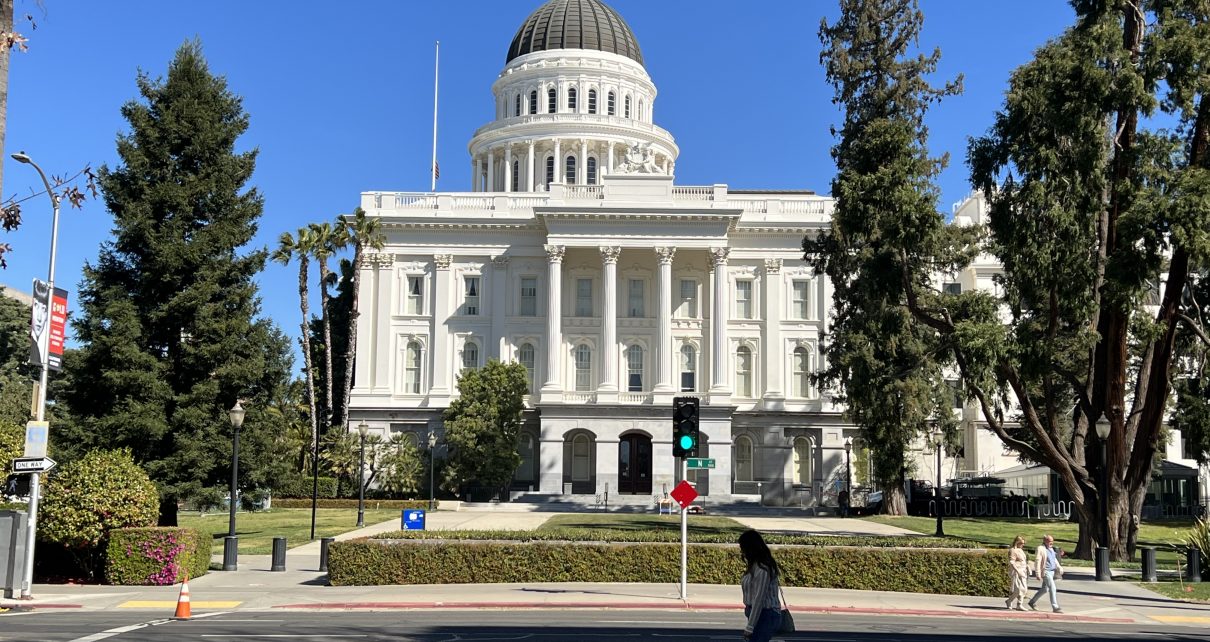
California State Capitol on March 11, 2022. (Photo: Kevin Sanders for California Globe).
Sabotage Prevention Act
Says that any person who violates any order is guilty of a misdemeanor
By Chris Micheli, December 14, 2024 2:30 am
California’s Military and Veterans Code, in Division 7, Chapter 2, contains the Sabotage Prevention Act of 1950.
Article 1 concerns general provisions and definitions. Section 1630 states that the chapter is cited as the Sabotage Prevention Act of 1950. Section 1631 specifies that the definitions and general provisions set forth in this article govern the construction of this chapter.
Section 1632 defines the term “highway.” Section 1633 defines the term “highway commissioners.” Section 1634 defines the term “public utility.” “Section 1635 defines the term “war.” Section 1636 defines the term “defense preparation.” Section 1637 says that, if conduct prohibited by this chapter is also made unlawful by another law, the offender may be convicted for the violation of this chapter or of the other law.
Section 1640 contains a severability clause.
Article 2 deals with the protection of property used for defense preparation. Section 1650 provides that any individual, partnership, association, corporation, municipal corporation, or the State or any of its political subdivisions engaged in, or preparing to engage in, defense preparation, whose property, except where it fronts on water or where there are entrances for railway cars, vehicles, persons, or things, is enclosed, may post around its property at each gate, entrance, dock, or railway entrance and every 100 feet of water front a sign reading “no entry without permission.”
Section 1651 specifies that any person who without permission of the owner wilfully enters upon any premises posted is guilty of a misdemeanor.
Section 1652 provides that any peace officer or any person employed as a security guard or in a supervisory capacity on premises posted may stop any person found on the premises and may detain that person for the purpose of demanding his or her name, address, and the reason for the person’s presence. If the peace officer or employee has reason to believe that the person so interrogated has no right to be on the premises, he or she may arrest the person without a warrant.
Section 1653 states that any individual or entity, or the State or any of its political subdivisions engaged in or preparing to engage in defense preparation, who has property so used which he believes will be endangered if public use and travel is not restricted or prohibited on any abutting highway, may petition the highway commissioners of any city or county to close or to restrict the use of and travel upon any part of the abutting highway lying within 150 feet of the property.
Section 1654 requires the highways commissioners, upon receipt of a petition, to set a day for hearing and give notice by publication in the city or county in which the property is located. Notice must be given at least seven days prior to the date set for hearing.
Section 1655 provides that, if after hearing the highway commissioners determine that the public safety and the safety of the property of the petitioner require that public use and travel upon any abutting highway be closed or restricted within 150 feet or less of the property, they must issue an order.
Section 1656 provides that appropriate notices in letters at least three inches high must be posted conspicuously at each end of any highway so closed or restricted by such order.
Section 1657 allows the highway commissioners to revoke or modify any order made.
Section 1658 authorizes the highway commissioners to issue written permits to travel over the highways so closed or restricted to be responsible and reputable persons for a term, under conditions, and in the form as the commissioners prescribe.
Section 1659 says that any person who violates any order is guilty of a misdemeanor.
Article 3 deals with sabotage. Section 1670 provides that any person who intentionally and maliciously destroys, impairs, injures, interferes, or tampers with real or personal property with reasonable grounds to believe that such act will hinder, delay, or interfere with the preparation of the United States or of any of the states for defense or for war, or with the prosecution of war by the United States, or with the rendering of assistance by the United States to any other nation in connection with that nation’s defense, is guilty of a felony.
Section 1671 provides that any person who intentionally and maliciously makes or causes to be made or intentionally and maliciously omits to note on inspection any defect in any article or thing with reasonable grounds to believe that the article or thing is intended to be used in connection with the preparation of the United States or any state for defense or for war, or for the prosecution of war by the United States, or with the rendering of assistance by the United States to any other nation in connection with that nation’s defense, or that the article or thing is one of a number of similar articles or things, some of which are intended so to be used, is guilty of a felony.
Section 1672 specifies how a person who is guilty of violating Section 1670 or 1671 is punished. Section 1673 states that any person who attempts to commit any of the crimes defined by this chapter is punishable as provided in Section 664 of the Penal Code, with specified exceptions.
Section 1674 provides that, if two or more persons conspire to commit any crime defined by this chapter, each is guilty of conspiracy and subject to the same punishment as if he had committed the crime which he conspired to commit, whether or not any act be done in furtherance of the conspiracy.
- Response to Interrogatories - February 20, 2026
- Insignia of Nonprofit Associations - February 19, 2026
- Endangered Species Regulation - February 19, 2026




